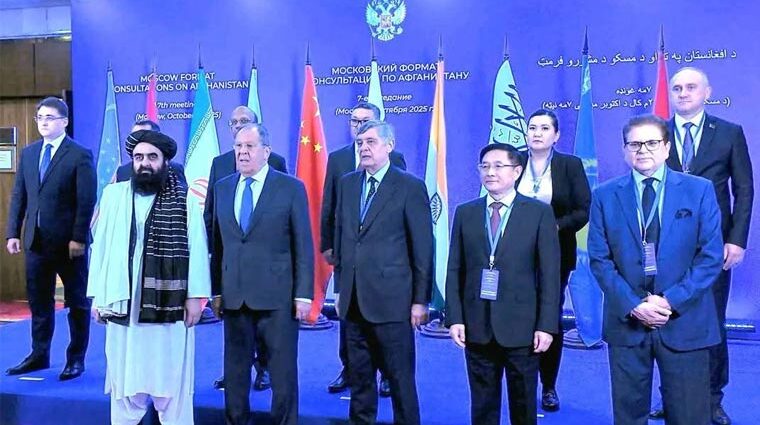Moscow Format Consultation: Emphasis on Assisting Afghanistan in Eliminating Terrorism
Global and regional cooperation is essential to transform Afghanistan into an independent, united, and peaceful state.
Moscow (Web News)
During the seventh Moscow Format Consultation, regional countries emphasized joint efforts to help Afghanistan eliminate terrorism, promote economic development, and strengthen regional connectivity. The joint communiqué stated that global and regional cooperation is essential to transform Afghanistan into an independent, united, and peaceful state.
Representatives from Afghanistan, India, Iran, Kazakhstan, China, Kyrgyzstan, Pakistan, Russia, Tajikistan, and Uzbekistan participated in the meeting, while Belarus attended as a guest. It was the first time that an Afghan delegation participated as a member state, led by Foreign Minister Amir Khan Muttaqi. The joint statement was also released by Pakistan’s Ministry of Foreign Affairs.
Participants stressed the need to include Afghanistan in economic and trade exchanges, investment projects, and major regional development initiatives. The meeting agreed that cooperation in public health, poverty reduction, agriculture, and disaster management is vital for Afghanistan’s sustainable development. The communiqué stated that integrating Afghanistan into regional connectivity frameworks would be an important step toward the region’s shared progress.
The participating countries reiterated their commitment to providing emergency humanitarian assistance to the Afghan people and urged the international community to accelerate such efforts, emphasizing that aid must not be used for political purposes.
The statement noted that terrorism poses a serious threat to Afghanistan, the region, and the entire world. Participants underscored that Afghan territory should not be used for terrorism against neighboring countries or other regions. Instead of mentioning any punitive measures against the Kabul administration, the communiqué emphasized assisting Afghanistan in eradicating terrorism.
It called for strengthening counterterrorism cooperation at bilateral and multilateral levels and assisting Afghanistan in taking comprehensive steps to eliminate terrorism completely so that Afghan soil is not used as a security threat to its neighbors or beyond. The communiqué reiterated that terrorism remains a grave threat to Afghanistan, the region, and the broader international community.
Participants also made it clear that attempts by certain countries to deploy military infrastructure in Afghanistan or its neighboring states are contrary to regional peace and stability and cannot be accepted.
The declaration urged countries responsible for Afghanistan’s current situation to fulfill their commitments regarding the nation’s economic recovery and future development, enabling Afghanistan to move swiftly toward a path of self-reliance and stability.
This seventh Moscow Format Consultation once again highlighted the need to address the Afghan issue within the broader context of regional peace and development and called for a coordinated, collective approach.

